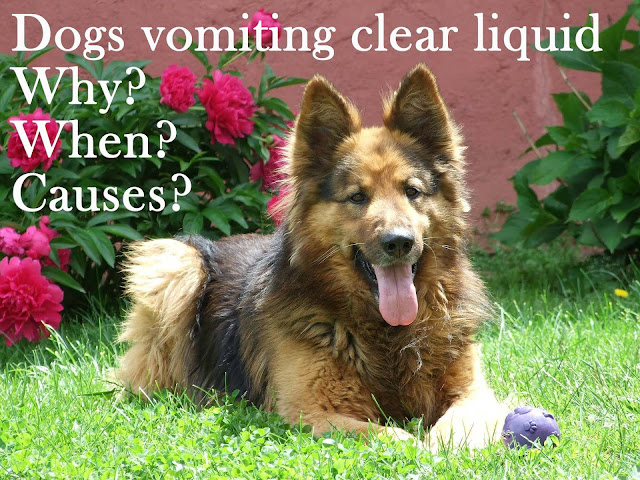Dogs vomiting clear liquid can be extremely worrisome for dog guardians. Read the complete blog post to understand the causes behind the same.
There are many causes behind dogs vomiting clear liquid. Clear liquid vomit mostly comprises of water and saliva. It may or may not be frothy. Mostly the explanation for a clear liquid vomit is that your dog drank too much of water and he or she drank it too quickly. There might also be other reasons for the same, so do not disregard this.
There is also a chance that your dog may have ingested something clear which could not get digested and is thus thrown back out.
Topics covered in this blog post
Possible reasons why your dog might be vomiting a clear liquid:
The common reasons why dogs vomit clear liquid are as follows
- · Hypothyroidism
- · Exposure to toxins
- · Infectious diseases
- · Gastrointestinal tract inflammation or pancreatitis
- · Parasitic infestation
- · An obstruction in the gastrointestinal tract
- · Indigestion due to overeating, overdrinking etc.
What can you do if your dog is vomiting clear liquid
As I mentioned before, if your dog vomited a clear liquid just once without any other signs of discomfort or illness, there is no cause of concern. Keep an eye on your dog for the following symptoms:
- · loss of appetite
- · diarrhea
- · weakness
- · lethargy
- · other signs of illness
Check your home for any possible exposure to toxins or foreign body ingestion
If your dog is otherwise normal, eating normally and playing, keep an eye out to check for more vomiting. If your dog vomits again, skip the next meal and continue the observation. After skipping one meal, offer the next meal and keep a watch on your dog for any signs of illness or further vomiting. In case your dog vomits one more time, call your vet.
If your dog is vomiting on a daily basis and this trend continues for many days, or if you want dog vomits more than two times in a period of 24 hours, it is time to visit your vet. You must also contact your vet in case there are other signs and symptoms of illness.
What is the treatment of vomiting in dogs:
If the vomiting continues, it is time for you to meet up with your veterinarian. Your vet will discuss your dog’s previous health issues, and long-term medical history with you. Remember to share all the information you have about your dog’s current and past medications as well as diet. Also, make sure to bring up everything and anything your dog has eaten in the past 24 hours which may or may not have led to the vomiting, like chemicals, dangerous foods or plants.
The first thing your vet will do is perform a thorough physical examination of your dog. Following this, your vet may also recommend you to get a few diagnostic tests to understand the cause of vomiting. The diagnostic tests usually include urine and blood testing, x-rays as well as an ultrasound.
The treatment course will be based on the results of the diagnosis. In most cases, the dog is treated with antacids, gastrointestinal tract protectant drugs and/or antinausea medications to provide relief. If your dog has been vomiting continuously, your red might prefer to administer the first doses in an injectable manner to avoid further instances of vomiting.
Other articles you may find interesting:
Causes behind acute and chronic vomiting in dogs.
Why is your dog vomiting and how to prevent the same?
Gastrointestinal obstruction :
In case your vet suspects a gastrointestinal obstruction to be the cause of repeated vomiting, he or she may suggest an endoscopy followed by surgery or an open surgery to remove the obstruction. The hospital stay will most likely be necessary after such a procedure.
Exposure to toxin
If your vet suspects that the reason your dog’s constant vomiting is because of exposure to a toxin, then the treatment course will depend on the kind of toxin your dog ingested. This may involve administering activated charcoal, contacting the animal poison control or other kinds of remedies. Your dog may or may not need to be hospitalized for this kind of treatment depending on the severity of the toxin.
Dehydration, infectious disease, pancreatitis
In case your vet is worried about your dog suffering from an infectious disease, dehydration or pancreatitis, he or she will likely have to hospitalize your dog. During hospitalization, your dog might be administered intravenous medication and fluids.
How to prevent vomiting in your dog?
Prevention is always better than cure. It is always a better option to arm yourself with all the knowledge of a specific condition. If you are aware of what to do in such a circumstance or if you know the preventive measures, it would be a much better option for both you as well as your canine companion.
There are a few things, which you can do as a dog guardian to prevent vomiting and to keep your dog healthy:
Keep all harmful chemicals, human food, toxins as well as toxic plants out of the reach of your dog.
Prevent your dog from chewing, licking or eating any dangerous or hazardous items. Visit your vet for routine examinations twice a year
Opt for a dog healthy diet and keep the treats to a minimum
Keep your veterinarian’s number handy, so that in case of an emergency you can immediately call and get help. If you are in a state of doubt, immediately head to the nearest open emergency veterinary hospital.
Conclusion:
As dog parents we worry over every small thing that happens to our pup. A sudden vomit can send dog parents in a frenzy. Hence, it is imperative that one acts with a cool mind during the state of emergency. Keep your vet’s number close by. Save it on your phone as well as have the visiting card of your vet stuck to the fridge, a place where anyone can easily find the contact number. Keep your pup away from any and everything which can cause him or her harm and all should be well. If you found this post informative, please subscribe to the blog, so I can send you regular updates and dog care tips directly to your inbox.


